- Home
- Dornford Yates
B-Berry and I Look Back Page 4
B-Berry and I Look Back Read online
Page 4
“Well, no one would take it on. So the clerk came back to me. ‘They’re all afraid, sir,’ he said. ‘Well, so am I,’ I said. ‘He can’t eat you, sir. Have a look at the case.’ Just then his telephone went, so he laid the brief on my table and left the room. I eyed it uncertainly. I wasn’t sure Eve couldn’t eat me, but I was rather ashamed of being afraid. Harker couldn’t afford to make a fool of himself; but I had no standing at all.
“So I rang up a fellow I knew at the Chancery Bar. When I told him what had happened, he laughed like hell. (I think it was his derision that forced me up to the gate. When I heard his mocking laughter, I knew I should take the case.) ‘Go and be murdered,’ he said. ‘Old Eve will chew you up. Besides, you’re poaching. That’s a Chancery brief.’ ‘That’s not my fault,’ I said. ‘The solicitors like us best. Now be a sport and tell me what to do.’ ‘I’d love to be there,’ he said, ‘but I’m on in another Court.’ ‘Thank God for that,’ said I. ‘But how do I go to work?’
“Well, so far as I could make out, applications were made, as usual, after the luncheon adjournment at two o’clock. My job was to sit quite still and hold my tongue until the usher cried out Any more motions behind the bar? And if nobody else got up, then I must get to my feet and state my case.”
“What does that mean?” said Daphne. “What is a motion and what is ‘behind the bar’?”
“I didn’t know then, my sweet, and I don’t know now. And, frankly, I really don’t care. The words are Chancery lingo and they can have them for me.”
“Allow me to observe,” said Berry, “that you ought to be in jail. Talk about obtaining money by false pretences…”
“Be quiet,” said everyone.
“Well, then I read the brief.”
“Only then,” said Berry. “God give me strength.”
“First things first,” I said. “Besides, they’d said it was a loser…
“Well, when I read it, it gave me rather a shock. The motion or application—”
“There you are,” said Berry. “You said a moment ago you didn’t know what a motion meant.”
“At that moment, I didn’t,” I said. “But now I do remember that, when someone makes an application to a Judge, he is said to be ‘moving the Court’ to do as he asks.
“Well, the motion or application which I was to make was on behalf of two sons to commit to prison their father for Contempt of Court.”
“You do seem to have had some nice cases,” said Berry. “Parricide now.”
“I admit it sounds rather bad; but it wasn’t as bad as it sounds. As far as I can remember, the position was roughly this.
“The father and his sons had a business in a North Country town. All three were partners. The sons, I may say, were hard-working, married men. A few months before, the three had agreed together to sell the business, as it stood. They had received an offer of twelve thousand pounds. This they had accepted. The father, as senior partner, was to take six, and each of the junior partners three thousand pounds.
“Well, the business was taken over, but the purchaser didn’t pay. When the sons protested, their father said, ‘That’s all right. He only wants time.’ Several weeks went by. At last the sons got impatient, and one of them went to see the purchaser. The latter said nothing, but rose and went to his safe. Then he laid before the son his father’s receipt for the sum of twelve thousand pounds. This bore the very date on which the purchase money should have been paid.
“As you may well believe, that was more than enough for the sons. They went to Court forthwith, and the father was ordered to pay the two their share, six thousand pounds, within seven days.
“That order was made on Monday, so he had till Monday next. But now the sons had discovered that their father had booked his passage for South America, and that the ship was due to sail on Saturday next. So that, if no action was taken, on Monday next he would be out of the jurisdiction… Hence this application.
“There could be no doubt that their money had already been transferred to some South American Bank: so that if their father sailed, they would never see it again. So I was to ask for an order to apprehend him at once and put him into prison, so that he could not sail. His behaviour, of course, was gross Contempt of Court.
“There’s no pretending that it was a savoury case. Sons don’t ask for their fathers to be cast into jail. But fathers, as a rule, don’t double-cross their sons: and six thousand pounds was a very great deal of money in 1913. The trouble was that Eve was not a Queen’s Bench Judge. He was very old-fashioned and had nothing to do with crime. I don’t suppose he’d ever been inside the Old Bailey. And he would be shocked to the marrow by an application which was redolent of such impiety.
“Well, I reached his Court in good time and sat down to wait for my cue. As the benches filled up, my neighbours regarded me. And not with sympathy. For I was a stranger – and I had a brief in my hand. Then a ‘silk’ turned round and favoured me with a stare. At last we all stood up, and Eve took his seat on the Bench.
“Some applications were made. Eve seemed to regard every one as a personal affront. He wasn’t rude, but he granted them grudgingly: and he jumped on anyone who put a foot wrong. And he seemed to know most of the counsel – called them by name.
“And then at last my turn came. The usher said his piece, but nobody else got up. And so I got to my feet.
“Before I could open my mouth –
“‘And what do you want?’ said Eve.
“That was rude – and the rudeness loosened my tongue.
“‘I’ll tell your lordship,’ I said. ‘I’m here on behalf of two sons to seek an immediate order committing their father to prison for Contempt of Court.’
“As soon as he could speak –
“‘Well you don’t think you’re going to get it, do you?’ barked Eve.
“As the Registrar gave him the affidavits –
“‘My lord,’ I said, ‘I venture to hope that your lordship will hear what I have to say. On the face of it, my lord, this is an impious request. But…’
“You see, the idea was to take the wind out of his sails. So I got in the word ‘impious’ before he did. I apologized for the motion and said that I hoped he’d believe that it was just as distasteful to me to make it as it must be for him to consider it, but that I had no choice: and that if he refused my request, two honest, decent men would be robbed of six thousand pounds.
“Well, he barked a good deal and was pretty rough with me. But the affidavits didn’t leave anything out. Then he played for time, but I was ready for that.
“‘Today is Thursday, my lord; and the time is half past two. And the ship sails on Saturday morning. If your lordship adjourns this motion, such adjournment will cost my clients six thousand pounds.’
“He spoke with the Registrar and he hummed and hawed. But in the end he granted the application.
“‘With the greatest reluctance,’ he said, ‘I do as you ask.’
“‘If your lordship pleases,’ I said, and resumed my seat.
“I never left a Court so quickly in all my life.”
“Allow me to say,” said Jonah, “that you did deserve to get on.”
“I quite agree,” said Daphne.
“My sweet,” said I, “I’ve mentioned two occasions on which I came off. But I had so many failures – lost cases I ought to have won. But those I try to forget. Any way, I’m talking off the record. This mustn’t go into a book.”
“I disagree,” said Jonah. “I’ll tell you why. You’re giving the low-down on the Bar – a thing that no legal memoir has ever done. You take us behind the scenes, revealing a state of affairs of which no layman dreams. Look at what you’ve just told us. Six thousand pounds at stake, and the sands running out, and clerks and solicitors and counsel all trying to pass the buck. To my mind this was a case for a powerful Chancery ‘silk’: instead, the lot falls upon you – who don’t even know the ropes. A Common Lawyer, you have to ask the procedure, befor
e you go into Court – to confront a testy Judge and endeavour to make him grant an odious request. A daw among peacocks, you get a hostile reception; and you only get home, thanks to your mother wit and the grace of God. And this is not fiction, but fact.”
“Oh, yes, it’s perfectly true. But—”
“I agree with Jonah,” said Berry. “It is a side-light, of course, but its glare is most arresting. Have you got any more like that?”
“Not at the moment,” I said. “And for Heaven’s sake don’t think that that memory is a fair sample of what in the ordinary way goes on behind the scenes. It was nothing of the kind. So far as I know, no other Chancery brief was ever delivered to us. And we did try to return it. If Harker had been there when it came, it would have been returned. But on Thursday there was next to no time for the agents to find someone else. They wouldn’t have sent it to us, if they’d had a Chancery man. Any way, they were sure it was ‘a loser’, so what the hell?”
“Oh, it wasn’t your fault,” said Jonah, “your Chambers’ fault, I mean. It mayn’t have been anyone’s fault, for the thing was so rushed. But if the unfortunate clients could have heard your conversation with your friend at the Chancery Bar – well, let us say that it would have spoiled their lunch.”
“They’d have gone stark, staring mad,” said Berry. “Give me the Inns of Court. They’re worse than Harley Street.”
My sister regarded her wristwatch.
“Give us something short, darlings, just to take us to bed.”
I looked at my brother-in-law.
“It’s up to you,” I said. “I’ve talked enough tonight.”
“There’s something in that,” said Berry. “Never mind. Let us pass from the squalid to the sublime, and consider for two or three minutes what are called Persian rugs.”
“Why ‘what are called’?” said Daphne.
“Because it is frequently a misnomer. The famous Tekke Bokhara is styled ‘a Persian rug’. In fact, it is nothing of the kind. It is a Turkoman or Turkestan rug, and it has no more to do with Persia than had that beautiful Kulah that used to hang on the powder-closet’s wall.”
Jill cried out at that.
“You’re not going to say that’s not a Persian rug?”
“I am, indeed, my sweet. The Kulah came out of Turkey and it is a Turkish rug.” He looked at Daphne. “And the Shemakha in your bedroom was a Caucasian rug.”
“Well, I never knew that,” said Daphne. “One always says ‘Persian rugs’.”
“I know. But considerably less than half the so-called ‘Persian rugs’ in fact come out of Persia. So the right word is ‘Oriental’.”
“But ‘Oriental’ means anything.”
“I know. It’s very awkward. All the same, you wouldn’t point to a nice piece of Spode and say ‘That’s Crown Derby’, would you? But that is what you’re doing when you call a Tekke Bokhara a Persian rug.
“The meanest, modern carpet is so expensive today that the market for genuine rugs must now be extremely small. And there can’t be many to buy. A few odd ones now and then, which come to be sold when death duties have to be paid. I suppose they go to collectors. Of course, quite a lot are offered.”
“Fakes,” said Jonah.
Berry nodded.
“As it was and ever shall be. And people are very stupid about Oriental rugs. They mayn’t be experts – very few people are. But they’ve ordinary common sense. If they were offered an old master for forty pounds, they’d laugh in the salesman’s face. But just because it’s a rug, instead of a picture, they have it put in the car and drive home and write the cheque. And, as like as not, it came from a Japanese factory that turns out two hundred a day.
“The real Oriental rug which our fathers knew is now a thing of the past – has been a thing of the past for many years. It was, of course, hand-made; and the wool which was used to make it was dyed with vegetable dyes. The first thing to pass was the dyes. It must be about ninety years since aniline dyes began to reach the East. There they were seized upon, because they saved so much trouble. And now the secrets of the vegetable dyes are lost. But the rugs were never the same, for the colours were not so soft, and wool grows brittle when dyed with an aniline dye. And then, of course, came the machines…
“So another craft sickened and died. Of course, it was easy money – right down machinery’s street. But no machine could do what the craftsman did. For he knew how to knot the pile to the warp, and he had infinite patience. His rugs are works of art and will see out Time. Upon the best of these, use will leave no trace. Some Tekke Bokhara rugs have nearly four hundred knots to every square inch.”
Jill put a hand to her head.
“But how ever long did it take to make such a rug?”
Berry shrugged his shoulders.
“Half a lifetime,” he said, “and sometimes longer than that. That’s why they are worth having. They’re human documents.”
6
“How’s the book going?” said Jonah.
“I can’t complain,” said I.
Berry looked up.
“Sub-conscious brain pulling well?”
“Like a train,” said I.
“I think you’ll love it,” said Jill. “He’s read me some.”
“Alleged humour?” said Berry.
“Quite a lot.”
“The conscious brain,” said Jonah, “is really an amanuensis?”
“More than that,” said I. “A kind of interpreter. For instance, not long ago the sub-conscious brain led me to a Roman road.”
“Our Roman road?” said Daphne.
“No, my darling,” I said. “I’d never seen this one before. Like ours, it had shrunk to a lane, but it had a gate in one side that gave to a lovely view. Well, I had a good look round, and then, with my conscious brain, I tried to describe the lane and the lovely view.”
“And when you’d done that?” said my sister.
“The sub-conscious brain took over and told me how to go on.”
“And till that moment,” said Jonah, “you’d no idea?”
“None whatever,” I said. “And I wasn’t expecting what happened. I don’t think you’ll see it coming, when I read you the tale. And yet it’s completely natural.”
“I remember once,” said Berry, “being led – no doubt by the sub-conscious brain, for I’d lost my way – to a very beautiful dunghill. I wasn’t expecting that, either. And I didn’t have to look round to describe how it smelt.”
Jonah and I were laughing, but Daphne and Jill were not at all amused.
When they paused for breath –
“All right, all right,” said Berry. “I was only seeking to embroider the hem of the Maestro’s garment.”
“You wicked liar,” said Daphne. “And it wasn’t your brain that led you to the dunghill. It was the homing instinct.”
“Oh, the vixen,” said Berry. “Now I shan’t buy you those digitated bed-socks you wanted. More. I shall keep to myself the first of some handsome trifles I had in mind.”
“What’s this?” said I.
“Oh, it’s too good, really,” said Berry, “to go in a book like this. It’s one of my belles-lettres. It ought to be bound in vellum and kept in a case. One hundred numbered copies at twenty guineas a go.”
“Let’s have it,” said Jonah.
“Oh, not just like that,” said Berry. “We ought really to have a fanfare. I suppose you couldn’t go on your knees.”
“We’ll leave that to posterity,” said Jonah.
“That you may do,” said Berry, “with every confidence.”
With that, he emptied his glass and sat back in his seat.
“The average man,” he observed, “has little inclination and less time to read what are commonly called ‘the standard works’. I mean, they’ve got to be got down to.” He looked at me. “Your comic strips make no such demand upon the intelligence. And so, since today the average man is always tired, they and their like offer him an easy escape from the t
rivial round. Which is, of course, why you sell your rotten books. Jane Austen is still read, and so is Trollope; but not by everyone. And there are many authors of even higher standing whose works the average man never considers.”
“That,” said I, “is undeniable. But that is because, as you have pointed out, leisure is a dead letter today.”
“As is liberty. Never mind. L seems unpopular. Now the point I am seeking to make is this. Neither you nor I are qualified to appraise the masterpiece: but we do know something about them. And since the treatises which are written by the great about the great are invariably beyond us, I make bold to assume that they are, often enough, beyond the average man. Yet for the masterpiece, there is a great deal to be said.”
“It’s like pictures,” said Jill. “No one’s ever got time to go inside a picture-gallery. But, if they did, they’d have to be turned out.”
“Exactly. And since the average man today has no time to study Velasquez or Spenser, I feel that an effort should be made to offer him, say, a slice of one of those glorious loaves. That can’t be done by a high-brow: he is too big a man. But the low-brow’s forte is the low-down…”
“I think you should take Chaucer,” said Daphne.
In a silence big with suspicion, Berry regarded his wife.
Then –
“You will now,” he said, “have the privilege of listening to the first of my collection of belles-lettres.
“It’s funny to think of somebody having a keen sense of humour six hundred years ago. Especially Dan Chaucer. (Why Dan? His name was Geoffrey: but Spenser calls him Dan.) For his portraits insist upon a reverend, sad-faced, bearded bloke, soberly apparelled. Yet he was a humorist of the first water. That his humour is sometimes broad, I frankly admit: but it’s damned good. Of course, till you get the hang of it, he isn’t easy to read: for his perfect English is old – ‘pore persoun’ for ‘poor parson’, for instance – and he uses many beautiful words, now out of currency. But he was not only a very great poet. He found time in his life to be a courtier, a soldier, a diplomat and a member of parliament. Geoffrey Chaucer, MP.”

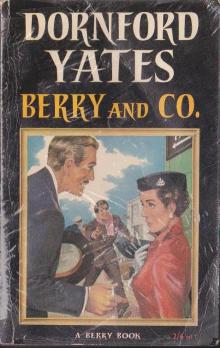 Berry and Co.
Berry and Co. Jonah and Co.
Jonah and Co.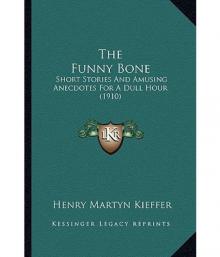 The Funny Bone: Short Stories and Amusing Anecdotes for a Dull Hour
The Funny Bone: Short Stories and Amusing Anecdotes for a Dull Hour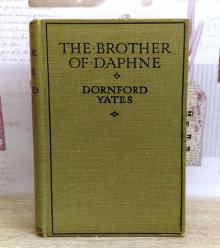 The Brother of Daphne
The Brother of Daphne Courts of Idleness
Courts of Idleness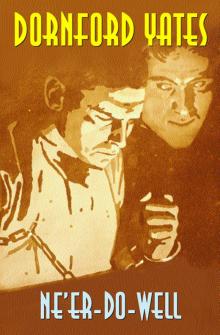 Ne'er Do Well
Ne'er Do Well She Painted Her Face
She Painted Her Face Safe Custody and Laughing Bacchante
Safe Custody and Laughing Bacchante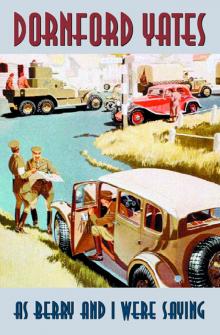 As Berry and I Were Saying
As Berry and I Were Saying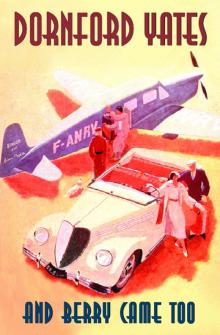 And Berry Came Too
And Berry Came Too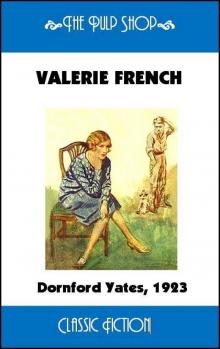 Valerie French (1923)
Valerie French (1923)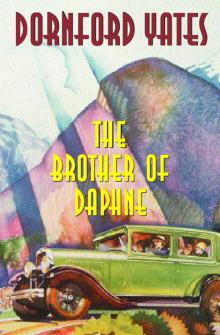 Brother of Daphne
Brother of Daphne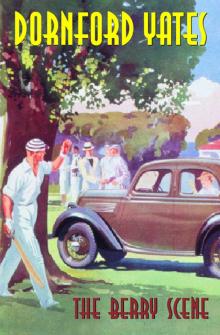 Berry Scene
Berry Scene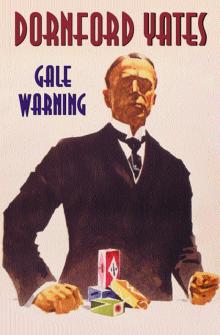 Gale Warning
Gale Warning B-Berry and I Look Back
B-Berry and I Look Back Storm Music (1934)
Storm Music (1934) House That Berry Built
House That Berry Built